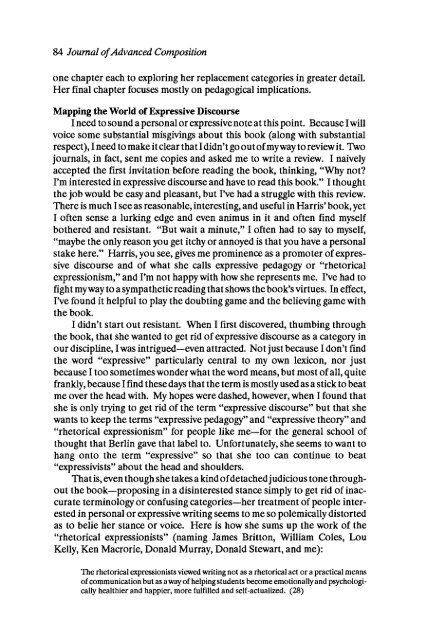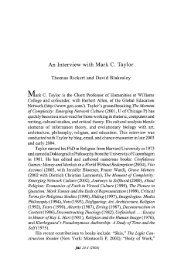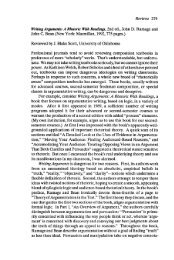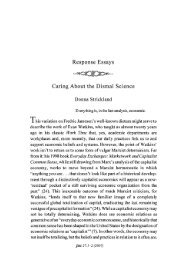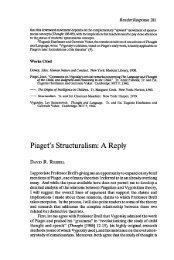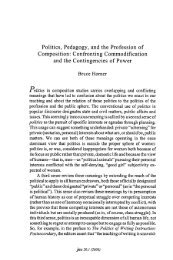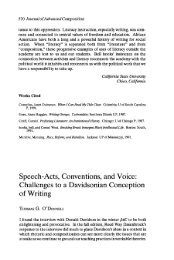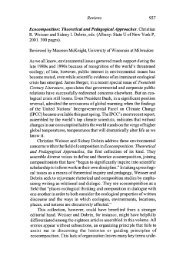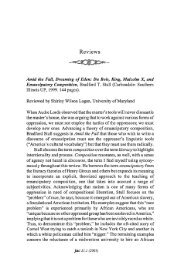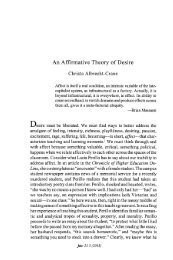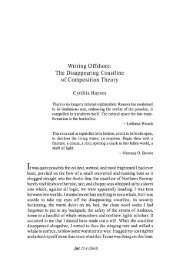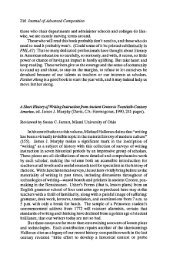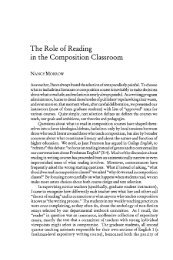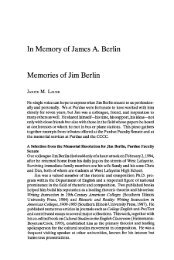Some Thoughts on Expressive Discourse: A Review ... - JAC Online
Some Thoughts on Expressive Discourse: A Review ... - JAC Online
Some Thoughts on Expressive Discourse: A Review ... - JAC Online
You also want an ePaper? Increase the reach of your titles
YUMPU automatically turns print PDFs into web optimized ePapers that Google loves.
84 Journal of Advanced Compositi<strong>on</strong><br />
<strong>on</strong>e chapter each to exploring her replacement categories in greater detail.<br />
Her final chapter focuses mostly <strong>on</strong> pedagogical implicati<strong>on</strong>s.<br />
Mapping the World of <strong>Expressive</strong> <strong>Discourse</strong><br />
I need to sound a pers<strong>on</strong>al or expressive note atthis point. Because I will<br />
voice some sub,litantial misgivings about this book (al<strong>on</strong>g with substantial<br />
respect),I need to make it clear that I didn't go out of my way to reviewi t. Two<br />
journals, in fact, sent me copies and asked me to write a review. I naively<br />
accepted the first invitati<strong>on</strong> before reading the book, thinking, "Why not?<br />
I'm interested in expressive discourse and have to read this book." I thought<br />
the job would be easy and pleasant, but I've had a struggle with this review.<br />
There is much I see as reas<strong>on</strong>able, interesting, and useful in Harris' book, yet<br />
I often sense a lurking edge and even animus in it and often find myself<br />
bothered and resistant. "But wait a minute," I often had to say to myself,<br />
"maybe the <strong>on</strong>ly reas<strong>on</strong> you get itchy or annoyed is that you have a pers<strong>on</strong>al<br />
stake here." Harris, you see, gives me prominence as a promoter of expressive<br />
discourse and of what she calls expressive pedagogy or "rhetorical<br />
expressi<strong>on</strong>ism," and I'm not happy with how she represents me. I've had to<br />
fight my way to a sympathetic reading that shows the book's virtues. In effect,<br />
I've found it helpful to play the doubting game and the believing game with<br />
the book.<br />
I didn't start out resistant. When I first discovered, thumbing through<br />
the book, that she wanted to get rid of expressive discourse as a category in<br />
our discipline, I was intrigued-even attracted. Not just because I d<strong>on</strong>'t find<br />
the word "expressive" particularly central to my own lexic<strong>on</strong>, nor just<br />
because I too sometimes w<strong>on</strong>der what the word means, but most of all, quite<br />
frankly, because I find these days that the term is mostly used as a stick to beat<br />
me over the head with. My hopes were dashed, however, when I found that<br />
she is <strong>on</strong>ly trying to get rid of the term "expressive discourse" but that she<br />
wants to keep the terms "expressive pedagogy" and "expressive theory" and<br />
"rhetorical expressi<strong>on</strong>ism" for people like me-for the general school of<br />
thought that Berlin gave that label to. Unfortunately, she seems to want to<br />
hang <strong>on</strong>to the term "expressive" so that she too can c<strong>on</strong>tinue to beat<br />
"expressivists" about the head and shoulders.<br />
That is, even though she takes a kind of detached judicious t<strong>on</strong>e throughout<br />
the book-proposing in a disinterested stance simply to get rid of inaccurate<br />
terminology or c<strong>on</strong>fusing categories-her treatment of people interested<br />
in pers<strong>on</strong>al or expressive writing seems to me so polemically distorted<br />
as to belie her stance or voice. Here is how she sums up the work of the<br />
"rhetorical expressi<strong>on</strong>ists" (naming James Britt<strong>on</strong>, William Coles, Lou<br />
Kelly, Ken Macrorie, D<strong>on</strong>ald Murray, D<strong>on</strong>ald Stewart, and me):<br />
The rhetorical expressi<strong>on</strong>ists viewed writing not as a rhetorical act or a practical means<br />
of communicati<strong>on</strong> but as a way of helping students become emoti<strong>on</strong>ally and psychologically<br />
healthier and happier, more fulfilled and self-actualized. (28)


